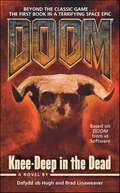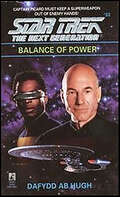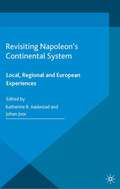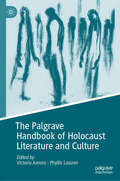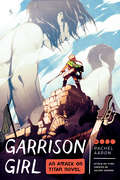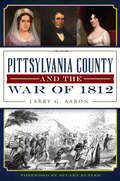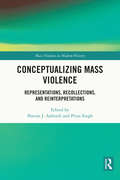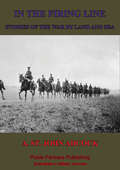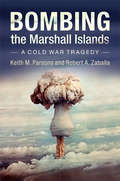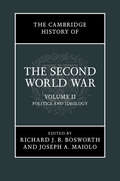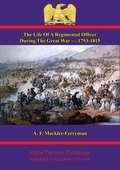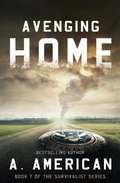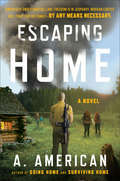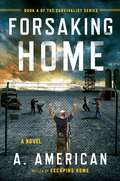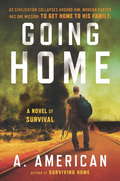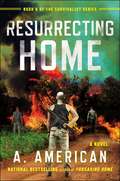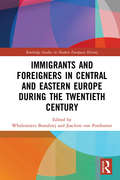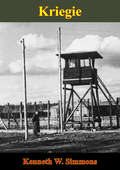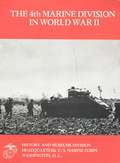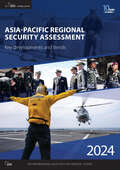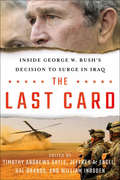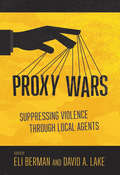- Table View
- List View
Knee-Deep in the Dead: A Novel (Doom #1)
by Dafydd ab Hugh Brad LinaweaverThe Gates were there on Phobos when mankind first arrived. Inert, unyielding, impossibly alien constructs, for twenty years they sat lifeless, mute testaments to their long-vanished creators, their secrets hidden. Then one day, they sprang to life... Meet Corporal Flynn Taggart, United States Marine Corps; serial number 888-23-9912. He's the best warrior the twenty-first century has to offer, which is a damn good thing. Because Flynn Taggart is all that's standing between the hell that just dropped in on Mars and an unsuspectingg planet Earth...
Balance of Power (Star Trek: The Next Generation #33)
by Dafydd ab HughWhen a famous Federation scientist dies, his son puts his inventions up for sale to the highest bidder, be they Federation, Klingon, Romulan, or Cardassian. Among the items at auction is a photon pulse canon capable of punching through a starship's shields with a single shot. Meanwhile, Wesley Crusher is kidnapped from the Academy by renegade Ferengi who have set their sights on the photon canon as well, and Captain Picard must outmaneuver enemies on every side to save Wesley and protect the EnterpriseTM from the deadly fire of the new canon.
Revisiting Napoleon’s Continental System
by Katherine B. Aaslestad Johan JoorNapoleonic warfare spread to the high seas, harbors and marketplaces across Europe and the Atlantic through the Continental System. This volume addresses the illicit commerce, new merchant networks, 'daily life', and tensions with neutral states generated by Anglo-French economic warfare. It also reveals the contradictions inherent in the Napoleonic Empire - at once rational and progressive, but also coercive and exploitative. Regional and urban case studies offer a more complete understanding of the significance of economic warfare during the Napoleonic era, and explore the experiences and consequences of the conflict through several key themes: a re-evaluation of the historiography of the Continental System, the uneven power triangle of the French, British and neutral powers, and the strategies of merchants and smugglers to adapt to or circumvent the system. Transnational case studies underscore the vulnerability and ingenuity of Europeans as they faced transformative social and economic challenges.
Revisiting Napoleon’s Continental System: Local, Regional and European Experiences (War, Culture and Society, 1750-1850)
by K. Aaslestad J. JoorEconomic warfare during the Napoleonic era transformed international commerce; redirecting trade and generating illicit commerce. This volume re-evaluates the Continental System through urban and regional case studies that analyze the power triangle of the French, British and neutral powers and their strategies to adapt to trade restrictions.
The Palgrave Handbook of Holocaust Literature and Culture
by Victoria Aarons Phyllis LassnerThe Palgrave Handbook of Holocaust Literature and Culture reflects current approaches to Holocaust literature that open up future thinking on Holocaust representation. The chapters consider diverse generational perspectives—survivor writing, second and third generation—and genres—memoirs, poetry, novels, graphic narratives, films, video-testimonies, and other forms of literary and cultural expression. In turn, these perspectives create interactions among generations, genres, temporalities, and cultural contexts. The volume also participates in the ongoing project of responding to and talking through moments of rupture and incompletion that represent an opportunity to contribute to the making of meaning through the continuation of narratives of the past. As such, the chapters in this volume pose options for reading Holocaust texts, offering openings for further discussion and exploration. The inquiring body of interpretive scholarship responding to the Shoah becomes itself a story, a narrative that materially extends our inquiry into that history.
Garrison Girl: An Attack on Titan Novel
by Rachel AaronThis original YA novel features all-new characters and a new story set in the world of Attack on Titan, the pop culture phenomenon and manga mega-hit.When the last vestige of the human race is threatened by unstoppable carnivorous giants, a brave young woman decides to defy her wealthy family and join the military garrison to battle humanity’s enemies. But Rosalie Dumarque soon finds that her dream of escaping the protection of Wall Rose not only leads to bloody sword fights with monsters, but exposes her to other dangers. Can she earn the trust of her fellow soldiers, stand up to a corrupt authority, navigate a forbidden romance...and cut her way out of a titan’s throat?Fans of the manga and anime, as well as YA readers new to the series, will devour this immersive and engaging experience of the Attack on Titan world.
Pittsylvania County and the War of 1812 (Military)
by Larry G. AaronRural Pittsylvania County and Danville, Virginia, remained far from the fields of conflict during the War of 1812. Yet its sons served valiantly along the Canadian frontier and in the defense of Richmond, Norfolk and Baltimore as British forces plundered villages up and down the Chesapeake Bay. General Andrew Jackson's wife, Rachel, a county native, celebrated the victory at the Battle of New Orleans with him. The homefront endured economic tribulations yet stood faithfully by its soldiers. Author and historian Larry G. Aaron reveals how Pittsylvania County served, suffered and sacrificed during the nation's second war of independence.
Crossing by Night
by David AaronShe was the young American wife of a stodgy British diplomat—a beautiful ornament to be displayed at important state functions. But Elizabeth Pack wanted more from life than formal consular gatherings and a loveless marriage. Dark clouds were gathering in the skies above Europe. An awesome German war machine was preparing to overrun the continent. And Elizabeth was ready and willing to do anything in her power to halt the Nazi juggernaut in its tracks... anything at all.
Conceptualizing Mass Violence: Representations, Recollections, and Reinterpretations (Mass Violence in Modern History)
by Navras J. Aafreedi Priya SinghConceptualizing Mass Violence draws attention to the conspicuous inability to inhibit mass violence in myriads forms and considers the plausible reasons for doing so. Focusing on a postcolonial perspective, the volume seeks to popularize and institutionalize the study of mass violence in South Asia. The essays explore and deliberate upon the varied aspects of mass violence, namely revisionism, reconstruction, atrocities, trauma, memorialization and literature, the need for Holocaust education, and the criticality of dialogue and reconciliation. The language, content, and characteristics of mass violence/genocide explicitly reinforce its aggressive, transmuting, and multifaceted character and the consequent necessity to understand the same in a nuanced manner. The book is an attempt to do so as it takes episodes of mass violence for case study from all inhabited continents, from the twentieth century to the present. The volume studies ‘consciously enforced mass violence’ through an interdisciplinary approach and suggests that dialogue aimed at reconciliation is perhaps the singular agency via which a solution could be achieved from mass violence in the global context. The volume is essential reading for postgraduate students and scholars from the interdisciplinary fields of Holocaust and Genocide Studies, History, Political Science, Sociology, World History, Human Rights, and Global Studies.
In The Firing Line: Stories Of The War By Land And Sea
by A. St. John AdcockArthur St. John Adcock was a novelist and poet of great repute in the early decades of the twentieth century. A noted journalist on Fleet Street, his great experience and literary acumen were ideal qualifications to produce this anthology volume of war stories from the frontlines of the First World War. Weaving the letters, diaries and reminiscences of the eye-witnesses, soldiers and officers who fought during the opening months of the war, he covers the battles around Mons, the destruction of Louvain, the fighting at Ypres and the first battle of the Marne and naval engagements in the North Sea.Well worth a read.
Bombing the Marshall Islands: A Cold War Tragedy
by Robert A. Parsons Keith M. ZaballaDuring the Cold War, the United States conducted atmospheric tests of nuclear weapons in the Marshall Islands of the Pacific. The total explosive yield of these tests was 108 megatons, equivalent to the detonation of one Hiroshima bomb per day over nineteen years. These tests, particularly Castle Bravo, the largest one, had tragic consequences, including the irradiation of innocent people and the permanent displacement of many native Marshallese. Keith M. Parsons and Robert Zaballa tell the story of the development and testing of thermonuclear weapons and the effects of these tests on their victims and on the popular and intellectual culture. These events are also situated in their Cold War context and explained in terms of the prevailing hopes, fears, and beliefs of that age. In particular, the narrative highlights the obsessions and priorities of top American officials, such as Lewis L. Strauss, Chairman of the Atomic Energy Commission.
The Cambridge History of The Second World War: Politics and Ideology (The\cambridge History Of The Second World War Ser.)
by Joseph A. Bosworth Joseph A. Maiolo Richard J. B. MaioloWar is often described as an extension of politics by violent means. With contributions from twenty-five eminent historians, Volume 2 of The Cambridge History of the Second World War examines the relationship between ideology and politics in the war's origins, dynamics and consequences. Part I examines the ideologies of the combatants and shows how the war can be understood as a struggle of words, ideas and values with the rival powers expressing divergent claims to justice and controlling news from the front in order to sustain moral and influence international opinion. Part II looks at politics from the perspective of pre-war and wartime diplomacy as well as examining the way in which neutrals were treated and behaved. The volume concludes by assessing the impact of states, politics and ideology on the fate of individuals as occupied and liberated peoples, collaborators and resistors, and as British and French colonial subjects.
The Life Of A Regimental Officer During The Great War — 1793-1815: Compiled From The Correspondence Of Colonel Samuel Rice, C.B., K.H. 51st Light Infantry And From Other Sources
by A. F. Mockler-Ferryman Colonel Samuel Rice C.B., K.H.The 51st Light Infantry, or 52nd as they were numbered during the French wars, were always viewed as a crack unit within the Duke of Wellington's Peninsular army. As a part of the Light Division, they formed part of the skirmish screen that would be the first to strike during an advance and the last bulwark of defence during a retreat.Colonel Samuel Rice fought in all of the 51st campaigns during the period starting as the most junior of officers, an ensign rising to the rank of Lt.-Colonel in November 1813. He fought in the engagements at Coruña, Fuentes d'Oñoro, Cuidad Rodrigo, the storm of Badajoz, Salamanca, San Murcial and Orthez. He also saw service on Corsica, Cape of Good Hope, Sri Lanka and at Waterloo near Hougomont. His letters are blended into a tight and gripping narrative by Antony Mockler-Ferryman, blending a historical overview with the eye-witness details of the individual.Author -- Mockler-Ferryman, A. F. 1856-1930.Author -- Colonel Samuel Rice, C.B., K.H.Text taken, whole and complete, from the edition published in Edinburgh, W. Blackwood and sons, 1913. Original Page Count - xv, 326 pages.
Avenging Home (The Survivalist Series #7)
by A. AmericanBooks 7 of the Survivalist Series follows Morgan and group as they fight to remove the DHS threat from the area. But there are bigger forces coming into play that will change everything.
Escaping Home: A Novel (The Survivalist Series #3)
by A. AmericanBook 3 of The Survivalist Series When society ceases to exist, who can you trust? After the collapse of the nation's power grid, America is under martial law--and safety is an illusion. As violence erupts around him, Morgan Carter faces one of his most difficult decisions yet: whether to stay and defend his home, or move to a more isolated area, away from the prying eyes of the government. He and his family are hesitant to leave their beloved Lake County, but with increasingly suspicious activities happening in a nearby refugee camp, all signs point towards defecting. Morgan and his friends aren't going to leave without a fight, though--and they'll do anything to protect their freedoms. From the author of the hit survivalist novels Going Home and Surviving Home, Escaping Home describes the struggle to live in a world with no rules, and how, sometimes, the strength of family is the only thing that can pull you through.
Forsaking Home
by A. AmericanBook 4 of The Survivalist Series They survived the collapse, but can they survive the aftermath? Morgan Carter has weathered the weeks after the collapse of the nation's power grid, reuniting with his family and ensuring their safety, but his struggle isn't over yet. Carter must focus on survival in an increasingly unstable society--but the challenges he faces are beyond his wildest imagination. Meanwhile, the enclosed quarters of the nearby government-run refugee camp make for an environment where injury, assault and murder are the norm. As Jess creates trouble within the camp, Sarge and his crew plot to take down the entire establishment. From the author of the hit Survivalist Series books, Forsaking Home is an action-packed adventure that depicts the harrowing possibilities of a world gone awry, and the courage it takes to protect what matters most.
Going Home: A Novel (The Survivalist Series #1)
by A. AmericanBook 1 of The Survivalist Series If society collapsed, could you survive? When Morgan Carter's car breaks down 250 miles from his home, he figures his weekend plans are ruined. But things are about to get much, much worse: the country's power grid has collapsed. There is no electricity, no running water, no Internet, and no way to know when normalcy will be restored--if it ever will be. An avid survivalist, Morgan takes to the road with his prepper pack on his back. During the grueling trek from Tallahassee to his home in Lake County, chaos threatens his every step but Morgan is hell-bent on getting home to his wife and daughters--and he'll do whatever it takes to make that happen. Fans of James Wesley Rawles, William R. Forstchen's One Second After, and The End by G. Michael Hopf will revel in A. American's apocalyptic tale.
Resurrecting Home
by A. AmericanBOOK 5 OF THE SURVIVALIST SERIES Against all odds, Morgan Carter and his family have endured despite the deteriorating conditions surrounding them. Armed with survivalist tactics, Morgan's crew, alongside their new friends from the recently-liberated DHS camp, have worked together to build a sustainable communuity. But not all situations can be prepared for. When a massive wildfire threatens their very existence, they must decide: fight or flight? From the author of the hit Survivalist Series books, Resurrecting Home is an action-packed adventure that depicts the harrowing possibilities of a world gone awry, and the courage it takes to protect what matters most.
Immigrants and Foreigners in Central and Eastern Europe during the Twentieth Century (Routledge Studies in Modern European History)
by W 322 Odzimierz Borodziej Joachim Von PuttkamerImmigrants and Foreigners in Central and Eastern Europe during the Twentieth Century challenges widespread conceptions of Central and Eastern European countries as merely countries of origin. It sheds light on their experience of immigration and the establishment of refugee regimes at different stages in the history of the region. The book brings together a variety of case studies on Poland, Hungary, Czechoslovakia, and Yugoslavia, and the experiences of return migrants from the United States, displaced Hungarian Jews, desperate German social democrats, resettled Magyars, resourceful tourists, labour migrants, and Zionists. In doing so, it highlights and explores the variety of experience across different forms of immigration and discusses its broader social and political framework. Presenting the challenges within the history of immigration in Eastern Europe and considering both immigration to the region and emigration from it, Immigrants and Foreigners in Central and Eastern Europe during the Twentieth Century provides a new perspective on, and contribution to, this ongoing subject of debate.
Kriegie
by 2nd Lieut. Kenneth W. SimmonsKenneth W. Simmons was a bombardier onboard one of the B-24 liberators of 389th Bombardment Group stationed in Europe during the Second World War. As the war ground to a close he had the sheer bad luck to be shot down in October 1944 near Bad Kreuznach and was captured and made prisoner of war. In this book he gives a vivid description of the life of POWs in the American section of Stalag Luft III (in what is now Poland) during the final months of the war, ending with the winter forced-march away from the camp, escaping the advancing Russian troops, and eventually being liberated.
The 4th Marine Division In World War II
by 1st Lieut. John C. ChapinThe major ground component of the active Marine Corps Reserve is the 4th Marine Division, Fleet Marine Force. The combat record of this division in World War II was exemplary; in the short space of one year it participated in four major amphibious assaults and won two presidential citations. The interest in its battle record among the reservists who now serve in its ranks has prompted the republication of this brief history, originally published in August 1945 and reprinted in 1974. This new reprint contains a brief history of the reserve 4th Division, written by Colonel Joseph B. Ruth, USMCR, a former member of the 25th Marines. Also included are copies of the division's lineage and honors, a list of its commanders, and a list of its units and their locations.The author of the 1945 history, then First Lieutenant John C. Chapin, served in the 3d Battalion, 24th Marines of the 4th Division. Assigned to the Historical Division when he recovered from wounds received in combat in Saipan, he completed this history and a similar one of the 5th Marine Division before his release from active duty.--E.H. Simmons, Brigadier General, U. S. Marine Corps (Ret.), Director of Marine Corps History and Museums
My Pen is the Wing of a Bird: New Fiction by Afghan Women
by"Powerful, profound and deeply moving, new fiction by Afghan women writers will expand your mind and elevate your heart" ELIF SHAFAK"Written in simple, direct prose and offers vivid snapshots of a country beset by war and violence . . . It seems more important than ever to read the work of these courageous writers" Financial Times"My pen is the wing of a bird; it will tell you those thoughts we are not allowed to think, those dreams we are not allowed to dream"A woman's fortitude saves her village from disaster. A teenager explores their identity in a moment of quiet. A petition writer reflects on his life as a dog lies nursing her puppies. A tormented girl tries to find love through a horrific act. A headmaster makes his way to work, treading the fine line between life and death."A precious collection of work, the first and maybe the last of its kind. My Pen Is the Wing of a Bird is a huge accomplishment" MONIQUE ROFFEY, author of The Mermaid of Black ConchMy Pen Is the Wing of a Bird is a landmark collection: the first anthology of short fiction by Afghan women. Eighteen writers tell stories that are both unique and universal - stories of family, work, childhood, friendship, war, gender identity and cultural traditions."This book reminds us that everyone has a story. Stories matter; so too the storytellers. Afghan women writers, informed and inspired by their own personal experiences, are best placed to bring us these powerful insights into the lives of Afghans and, most of all, the lives of women. Women's lives, in their own words - they matter." Lyse Doucet in her IntroductionThis collection introduces extraordinary voices from the country's two main linguistic groups (Pashto and Dari) with original, vital and unexpected stories to tell, developed over two years through UNTOLD's Write Afghanistan project. My Pen Is the Wing of a Bird comes at a pivotal moment in Afghanistan's history, when these voices must be heard.With an Introduction by BBC Chief International Correspondent Lyse Doucet and an Afterword by Lucy HannahABOUT UNTOLD UNTOLD is a writer development programme for marginalised writers in areas of conflict and post-conflict. Afghanistan has millions of Pashto and Dari speakers with little or no local support for creative writing, literary translation, or literary editing. Support for writers has been hampered by cultural norms, free expression issues, chronic instability, and internal displacement. UNTOLD has been working one-to-one with women on their short stories, with English-speaking literary editors and translators working with the writers to realise the potential of their stories for publication both locally and globally in translation.
Asia-Pacific Regional Security Assessment 2024: Key developments and trends
The Asia-Pacific Regional Security Assessment (APRSA) examines key regional security policies and challenges relevant to the proceedings of the IISS Shangri-La Dialogue, Asia’s premier defence summit convened by the International Institute for Strategic Studies (IISS). It is published and launched at the Dialogue and the issues analysed within its covers are central to discussions at the event and beyond. This eleventh edition comes as the APRSA celebrates its first decade. A dozen IISS experts reflect on a decade of change and continuity across major security policies and challenges facing the Asia-Pacific region. Three themes materialise across six chapters: the pressure and constraints surrounding great-power competition, the enduring value of alliances and partnerships and the impact of advanced and emerging technology for regional security dynamics.In addition to the introduction, the APRSA will now feature a special-topic chapter providing a deeper analysis of an enduring security policy and challenge. The other five chapters investigate further key dimensions of the regional security environment, supported by maps, graphs, charts and tables. The six chapters of this year’s APRSA cover the following topics: Combined military exercises in the Asia-Pacific Crisis management between the United States and China India’s defence partnership in the Asia-Pacific Diplomatic approaches to managing the Myanmar conflict Disinformation campaigns in the Asia-Pacific The Asia-Pacific air-to-air challenge
The Last Card: Inside George W. Bush's Decision to Surge in Iraq
This is the real story of how George W. Bush came to double-down on Iraq in the highest stakes gamble of his entire presidency. Drawing on extensive interviews with nearly thirty senior officials, including President Bush himself, The Last Card offers an unprecedented look into the process by which Bush overruled much of the military leadership and many of his trusted advisors, and authorized the deployment of roughly 30,000 additional troops to the warzone in a bid to save Iraq from collapse in 2007.The adoption of a new counterinsurgency strategy and surge of new troops into Iraq altered the American posture in the Middle East for a decade to come. In The Last Card we have access to the deliberations among the decision-makers on Bush's national security team as they embarked on that course. In their own words, President George W. Bush, Vice President Dick Cheney, National Security Advisor Stephen Hadley, Secretary of State Condoleezza Rice, White House Chief of Staff Joshua Bolten, Secretary of Defense Robert Gates, and others, recount the debates and disputes that informed the process as President Bush weighed the historical lessons of Vietnam against the perceived strategic imperatives in the Middle East. For a president who had earlier vowed never to dictate military strategy to generals, the deliberations in the Oval Office and Situation Room in 2006 constituted a trying and fateful moment.Even a president at war is bound by rules of consensus and limited by the risk of constitutional crisis. What is to be achieved in the warzone must also be possible in Washington, D.C. Bush risked losing public esteem and courted political ruin by refusing to disengage from the costly war in Iraq. The Last Card is a portrait of leadership—firm and daring if flawed—in the Bush White House.The personal perspectives from men and women who served at the White House, Foggy Bottom, the Pentagon, and in Baghdad, are complemented by critical assessments written by leading scholars in the field of international security. Taken together, the candid interviews and probing essays are a first draft of the history of the surge and new chapter in the history of the American presidency.
Proxy Wars: Suppressing Violence through Local Agents
The most common image of world politics involves states negotiating, cooperating, or sometimes fighting with one another; billiard balls in motion on a global pool table. Yet working through local proxies or agents, through what Eli Berman and David A. Lake call a strategy of "indirect control," has always been a central tool of foreign policy. Understanding how countries motivate local allies to act in sometimes costly ways, and when and how that strategy succeeds, is essential to effective foreign policy in today's world. In this splendid collection, Berman and Lake apply a variant of principal-agent theory in which the alignment of interests or objectives between a powerful state and a local proxy is central. Through analysis of nine detailed cases, Proxy Wars finds that: when principals use rewards and punishments tailored to the agent's domestic politics, proxies typically comply with their wishes; when the threat to the principal or the costs to the agent increase, the principal responds with higher-powered incentives and the proxy responds with greater effort; if interests diverge too much, the principal must either take direct action or admit that indirect control is unworkable. Covering events from Denmark under the Nazis to the Korean War to contemporary Afghanistan, and much in between, the chapters in Proxy Wars engage many disciplines and will suit classes taught in political science, economics, international relations, security studies, and much more.
